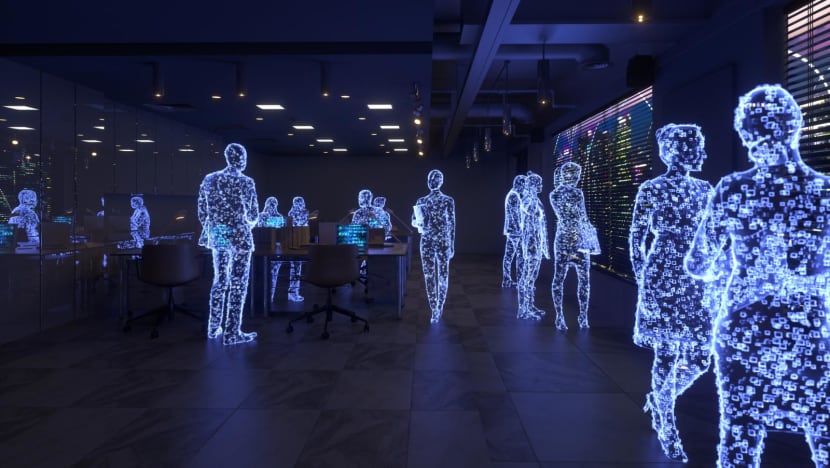Commentary: Look beyond a universal basic income for answers to AI future
As disruptive as artificial intelligence may be, unemployment or re-employment support could be more useful than a universal basic income in the pure form of cash handouts, say Lee Kuan Yew School of Public Policy’s Terence Ho and Primer AI’s Brian Lim.

SINGAPORE: A guaranteed income from the government without means testing or condition of employment? Tesla founder Elon Musk and OpenAI CEO Sam Altman are among the technology moguls and industry leaders who have advocated for a Universal Basic Income (UBI).
Linked to this is the idea that robotics and artificial intelligence (AI) will displace jobs on a large scale, putting the age-old model of work-based income at risk. The recent rise to prominence of generative AI has given fresh impetus to this notion.
The eminent British economist John Maynard Keynes, writing in 1930, had postulated that labour-saving technology would give workers a 15-hour week by 2030, giving them the challenge of finding meaningful ways to occupy their time.
However, the history of innovation strongly suggests that while new technology may change the nature of work, it will not render humans superfluous.
Inventions such as the spinning jenny and the motorcar displaced cottage industry textile workers and drivers of horse carriages, but replaced them with machine operators and car drivers. The advent of the internet has created new jobs such as web designers, electronic marketeers and online influencers. According to an estimate by labour economist David Autor, 60 per cent of jobs in 2018 did not exist in 1940.
As transformative as generative AI may be, there is no reason to believe that its net impact on jobs will be different from the many major innovations that have come before. Already, prompt engineers and other new job opportunities have emerged as AI tools are increasingly deployed in business processes.
HUMAN BEINGS ARE STILL NEEDED
Human beings will still have important roles to play in our AI-dominated future.
For one, what happens when technology fails or end users require human support? Some level of human supervision and intervention remains necessary.
In supermarkets, self-checkout counters still have a roving human attendant to help customers. At Changi Airport, there is always at least one manned immigration counter despite automated lanes using sophisticated facial recognition technologies.
Human beings are also still required to exercise professional responsibility and judgment. Some jobs are compensated not so much for human output but for taking on risk and responsibility, such as lawyers advising companies or architects and engineers signing off on building plans.
In a similar vein, only people can make judgment calls based on values and ethics. Leaders – whether in the private, public or non-profit sectors – need not fear being replaced by AI as decisions that determine the direction of a company, organisation or society itself cannot be devolved to machines, at least not in a way that is acceptable to most employees or citizens.
Why too do we imagine that there won’t be enough work to occupy both humans and machines? The idea that the amount of work is fixed or finite, which economists call the “lump of labour” fallacy, has long been discarded.
Higher productivity arising from AI could in fact generate more work. AI will not eliminate coding jobs as there is always more that can be done. As automation costs fall due to increased coding productivity, even more tasks can be automated. Programmers are likely to find themselves directing AI coding efforts and reviewing AI output for disinformation and bias.
Most importantly, AI and automation cannot replace human beings in many jobs where empathy and the human touch are valued, such as in hospitality and healthcare. Those who can leverage AI to do their jobs more efficiently can devote greater attention to the interpersonal aspects, including interaction with customers and stakeholders.
ADVANTAGES AND LIMITATIONS OF UBI
Even where AI does replace jobs, it may take a while for these jobs completely disappear, given that society often takes time to adapt to new technologies. All things considered, it’s hard to imagine a scenario where AI leads to the sudden disappearance of vast numbers of jobs, making UBI a societal imperative.
UBI, of course, has aims that are not limited to replacing employment income. As a social welfare instrument, it can help those in need who have difficulty accessing other forms of social support. It may be cheaper to administer than welfare schemes with complex eligibility criteria.
Unlike support that is contingent on current or previous paid employment, UBI does not disregard the value of non-market work such as caregiving, while enabling recipients to avoid the stigma associated with other forms of state assistance.
However, UBI in its pure form – where everyone receives the same payout regardless of means – can be exceedingly expensive and fiscally unsustainable if it is at the level where it can replace income. Sam Altman has suggested that the efficiency gains from AI can generate sufficient surplus to be redistributed as UBI, but this remains to be seen.
WHAT’S REALLY NEEDED
The reality is that jobs and wages likely to remain the mainstay of income for most, at least for the foreseeable future.
Given that AI, like most major innovations before it, will displace and transform a large number of jobs, what is needed most is an effective system for retraining and reskilling. In Singapore, the SkillsFuture ecosystem comprising training providers and grants, performs this role. It is a function that will be increasingly critical for individuals and society in the age of AI.
We will need stronger safety nets for temporary unemployment and perhaps even for income loss during transitions from one job to another. The plan to introduce re-employment support in Singapore is timely.
More broadly, we will need stronger assurance for citizens, particularly in a global city with high living costs. This could take various forms from housing and healthcare subsidies to wage supplements and other forms of transfer payments.
Collectively, they need to add up to a package that gives citizens peace of mind, even as we all must apply ourselves to contribute meaningfully to society in our AI future.
Terence Ho is Associate Professor in Practice at Lee Kuan Yew School of Public Policy. He is the author of Refreshing the Singapore System: Recalibrating Socio-Economic Policy for the 21st Century (World Scientific, 2021).
Brian Lim is APAC General Manager of Primer AI. He is also an industry advisor to Singapore University of Technology and Design Social AI Studio, and member of MIT Technology Review Global Insights Panel.



















